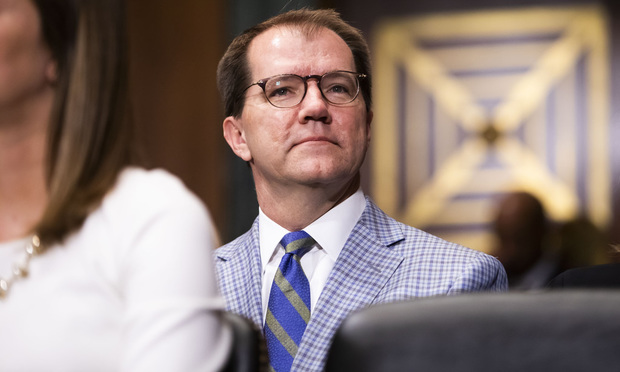Texas and Louisiana Tout Pro-Trump Emoluments Ruling to Defend Abortion Restrictions
The Debevoise & Plimpton lawyer challenging the Louisiana state laws countered: "The only question before this panel today is how far it is willing to go to bypass the ordinary rules of civil and appellate procedure to create a fast track for merits review in abortion cases."
August 12, 2019 at 03:16 PM
6 minute read
 Andrew Oldham testifies before the Senate Judiciary Committee during his confirmation hearing to be U.S. Circuit Judge for the Fifth Circuit in April 2018. (Photo: Diego M. Radzinschi / ALM)
Andrew Oldham testifies before the Senate Judiciary Committee during his confirmation hearing to be U.S. Circuit Judge for the Fifth Circuit in April 2018. (Photo: Diego M. Radzinschi / ALM)
Lawyers for Louisiana and Texas are relying on President Donald Trump’s recent emoluments clause victory to press a federal appeals court to use a rare remedy to thwart a complaint that broadly challenges Louisiana’s abortion regulatory scheme.
A lawyer for Louisiana, which lost its motion to dismiss the suit, on Friday urged the U.S. Court of Appeals for the Fifth Circuit to issue a writ of mandamus, a move that could stop the case in its tracks before any finding on the merits.
The U.S. Supreme Court has said an appellate court may issue that order only on a finding of “exceptional circumstances amounting to a judicial usurpation of power,” or a “clear abuse of discretion” by a district court. The appeals panel that heard arguments included two recent Trump appointees—Judges Don Willett and Andrew Oldham—and Judge Priscilla Owen, a George W. Bush appointee.
“The petitioners have brought kitchen-sink pleading,” Louisiana Solicitor General Elizabeth Murrill told the three-judge panel hearing the case June Medical Services v. Gee. “They are enormous claims that create an enormous invasion of state interests to regulate health facilities generally and specifically with regard to abortion.”
The resolution of the case could have broader reach, providing a new avenue for Republican-led states looking for ways to rein in abortion-related challenges and a new hurdle for the challengers themselves. Similar, broadly themed cases as the Louisiana challenge are pending in other states outside the Fifth Circuit, which hears federal appeals from Texas, Mississippi and Louisiana. Texas Solicitor General Heather Hacker was granted argument time in the case as a friend-of-the-court backing Louisiana.
Willett, a former Texas Supreme Court justice, pressed Murrill to identify the cases she was relying on for her assertion that a writ of mandamus was appropriate to stop the abortion litigation. Murrill, and later Hacker of Texas, both cited In re Donald J. Trump, a July 10 decision by the Fourth Circuit.
 Judge Don Willett. (Photo: Diego M. Radzinschi / ALM)
Judge Don Willett. (Photo: Diego M. Radzinschi / ALM)The panel in that case dismissed a suit by Maryland and the District of Columbia that alleged Trump had violated the Constitution’s emoluments clauses. A three-judge panel granted Trump’s petition for a writ of mandamus, and the decision halted the ability of the District and Maryland to explore the president’s financial affairs.
“I would compare this to that, where the court said that mandamus is appropriate to protect the state from vexatious litigation that distracts state officers from performing their constitutional duties,” Murrill told the Fifth Circuit panel. “This is exactly that kind of litigation.”
The Louisiana lawsuit, filed by the Center for Reproductive Rights and New York’s Debevoise & Plimpton on behalf of June Medical Services, alleged that the state’s Outpatient Abortion Facility Licensing Law, 13 of its implementing regulations and 12 provisions of Louisiana’s criminal code and public health laws are unconstitutional.
The complaint said the regulations “had the purpose and effect of placing substantial obstacles in the way of women seeking abortions and radically limiting access to safe and legal abortion to the detriment of women’s health.”
“The only question before this panel today is how far it is willing to go to bypass the ordinary rules of civil and appellate procedure to create a fast track for merits review in abortion cases,” Debevoise & Plimpton partner Shannon Selden told the Fifth Circuit panel.
Louisiana has asked the panel to dismiss two counts in the lawsuit and to apply “correct pleading and jurisdictional” rules to the claims involving individual abortion regulations.
Selden urged the Fifth Circuit not “to be in the business of reviewing the factual allegations of a complaint after the denial of a motion to dismiss.” A writ of mandamus, Selden argued, “is an extraordinary writ, not a ticket to the fast lane.”
But Oldham, formerly general counsel to Texas Gov. Greg Abbott and a law clerk to Justice Samuel Alito Jr., pressed Selden often on the particulars of the complaint and on whether, and how, her clients were harmed by such regulations as those involving physical space, hot and cold water and sterile instruments.
“Plaintiffs are not required to plead with particularity exactly what would happen if the statute were struck down,” Selden told Oldham in one exchange. The district court, Selden said, found sufficient facts to put Louisiana on notice about the claims, she said. What the exact effect of each challenged regulation is and the appropriate relief “is a question for the district court,” she argued.
Selden warned that “defendants would line up down the block” if they thought they could petition for mandamus whenever a trial judge denied a motion to dismiss. “One of the great promises of the federal rules and process is any litigant can file a claim and will be heard and the same rules apply to all,” she said.
Louisiana’s Murrill told the appeals judges that she “takes issue” with Selden’s argument that the Fifth Circuit can’t “airlift” claims out of the district court. “It can do that,” she said. “It is the only remedy we have when harms can’t be addressed any other way.”
June Medical Services has a petition for review pending in the U.S. Supreme Court in which it challenges a Fifth Circuit decision that upheld a state law requiring abortion providers to have admitting privileges at local hospitals. The Supreme Court, in a 5-4 ruling in February, put the Fifth Circuit decision on hold pending the filing of a petition.
Read more:
How a Trump-Appointed Judge’s Recusal Sped Up Indiana’s Anti-Abortion Challenge
The Justices Had 5 Votes to Overturn ‘Roe’ in 1992. Why That Didn’t Happen.
Why Roberts Sided With Liberals Blocking Restrictive Louisiana Abortion Law
DC Circuit Rejects Trump’s Blanket Ban on Immigrant Minors’ Abortions
Former SCOTUS Clerks Dominate the Ranks of Trump’s Judicial Nominees
This content has been archived. It is available through our partners, LexisNexis® and Bloomberg Law.
To view this content, please continue to their sites.
Not a Lexis Subscriber?
Subscribe Now
Not a Bloomberg Law Subscriber?
Subscribe Now
NOT FOR REPRINT
© 2025 ALM Global, LLC, All Rights Reserved. Request academic re-use from www.copyright.com. All other uses, submit a request to [email protected]. For more information visit Asset & Logo Licensing.
You Might Like
View All
RFK Jr. Will Keep Affiliations With Morgan & Morgan, Other Law Firms If Confirmed to DHHS
3 minute read
'Religious Discrimination'?: 4th Circuit Revives Challenge to Employer Vaccine Mandate
2 minute read
'Pull Back the Curtain': Ex-NFL Players Seek Discovery in Lawsuit Over League's Disability Plan

Trending Stories
Who Got The Work
J. Brugh Lower of Gibbons has entered an appearance for industrial equipment supplier Devco Corporation in a pending trademark infringement lawsuit. The suit, accusing the defendant of selling knock-off Graco products, was filed Dec. 18 in New Jersey District Court by Rivkin Radler on behalf of Graco Inc. and Graco Minnesota. The case, assigned to U.S. District Judge Zahid N. Quraishi, is 3:24-cv-11294, Graco Inc. et al v. Devco Corporation.
Who Got The Work
Rebecca Maller-Stein and Kent A. Yalowitz of Arnold & Porter Kaye Scholer have entered their appearances for Hanaco Venture Capital and its executives, Lior Prosor and David Frankel, in a pending securities lawsuit. The action, filed on Dec. 24 in New York Southern District Court by Zell, Aron & Co. on behalf of Goldeneye Advisors, accuses the defendants of negligently and fraudulently managing the plaintiff's $1 million investment. The case, assigned to U.S. District Judge Vernon S. Broderick, is 1:24-cv-09918, Goldeneye Advisors, LLC v. Hanaco Venture Capital, Ltd. et al.
Who Got The Work
Attorneys from A&O Shearman has stepped in as defense counsel for Toronto-Dominion Bank and other defendants in a pending securities class action. The suit, filed Dec. 11 in New York Southern District Court by Bleichmar Fonti & Auld, accuses the defendants of concealing the bank's 'pervasive' deficiencies in regards to its compliance with the Bank Secrecy Act and the quality of its anti-money laundering controls. The case, assigned to U.S. District Judge Arun Subramanian, is 1:24-cv-09445, Gonzalez v. The Toronto-Dominion Bank et al.
Who Got The Work
Crown Castle International, a Pennsylvania company providing shared communications infrastructure, has turned to Luke D. Wolf of Gordon Rees Scully Mansukhani to fend off a pending breach-of-contract lawsuit. The court action, filed Nov. 25 in Michigan Eastern District Court by Hooper Hathaway PC on behalf of The Town Residences LLC, accuses Crown Castle of failing to transfer approximately $30,000 in utility payments from T-Mobile in breach of a roof-top lease and assignment agreement. The case, assigned to U.S. District Judge Susan K. Declercq, is 2:24-cv-13131, The Town Residences LLC v. T-Mobile US, Inc. et al.
Who Got The Work
Wilfred P. Coronato and Daniel M. Schwartz of McCarter & English have stepped in as defense counsel to Electrolux Home Products Inc. in a pending product liability lawsuit. The court action, filed Nov. 26 in New York Eastern District Court by Poulos Lopiccolo PC and Nagel Rice LLP on behalf of David Stern, alleges that the defendant's refrigerators’ drawers and shelving repeatedly break and fall apart within months after purchase. The case, assigned to U.S. District Judge Joan M. Azrack, is 2:24-cv-08204, Stern v. Electrolux Home Products, Inc.
Featured Firms
Law Offices of Gary Martin Hays & Associates, P.C.
(470) 294-1674
Law Offices of Mark E. Salomone
(857) 444-6468
Smith & Hassler
(713) 739-1250










